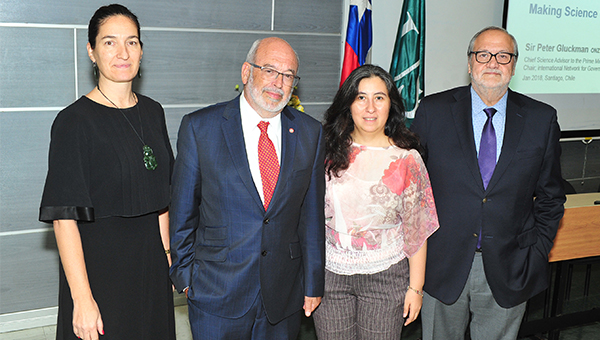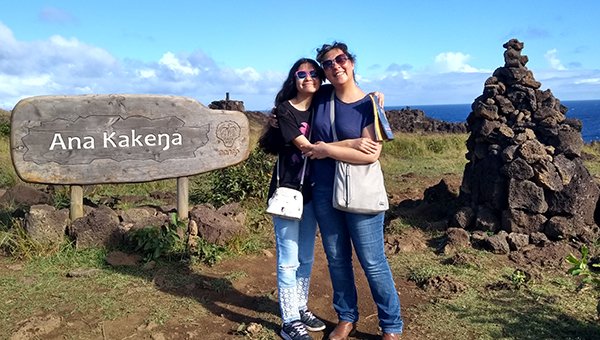Finding Light in the Darkness
By Jennifer Monahan
Soledad Quiroz Valenzuela (MSPPM ’09) is eminently qualified to serve as a science policy advisor, but when she returned to her home country of Chile in 2009 after several years of advanced study in the United States, opportunities were limited.
At the time, Chile’s government did not have a ministry of science. Quiroz Valenzuela worked instead as the department program advisor for the School of Biotechnology at the University of St. Thomas in Santiago.
With a Ph.D. in biochemistry from Michigan State University and a master’s degree in public policy from Carnegie Mellon University, Quiroz Valenzuela’s credentials were impeccable. The country’s infrastructure just wasn’t there yet, though it has grown in recent years.
“Most of the scientists were still very isolated from the public, and more so from decision-makers, unaware of the need to communicate with them,” Quiroz Valenzuela recalled. “Plus, I had to get to know my own country again. I had been away for seven years and it had changed a lot.”
Quiroz Valenzuela started her own investigation to understand how the institutions related to science and technology development were working in Chile, publishing a book in 2016 with her findings. She organized a country-wide meeting of scientists in 2016 to discuss barriers to research and proposals to overcome them. The results of the meeting were used by the National Commission for Scientific and Technological Research, the main governmental research agency in the country, to develop a series of changes and policies.
Quiroz Valenzuela also encountered the International Network for Government Science Advice (INGSA), whose mission is to provide a forum for policy makers, practitioners, national academies, and academics to share experience, build capacity and develop theoretical and practical approaches to the use of scientific evidence in informing policy at all levels of government.
“Finding INGSA and their approach to science advising was like finding a light in the darkness,” Quiroz Valenzuela said. “I thought, this is what I want to do.”
In addition to her current full-time role as a researcher for the InES Open Science Project at the Central University of Chile in Santiago, Quiroz Valenzuela now serves as vice president of policy for INGSA.

INGSA in Chile
Quiroz Valenzuela invited INGSA founder Peter Gluckman to give a talk at the Universidad Santo Tomás in Chile in 2018.
From left: New Zealand's Ambassador to Chile, Jacqui Caine; Peter Gluckman; Soledad Quiroz Valenzuela; and Exequiel González, the Vice Chancellor or Research from Universidad Santo Tomás.
Bringing scientific evidence to bear on big problems is the goal of science advisors. Complex issues like violence in schools, the effects of the pandemic on mental health, or climate change affect countries around the world. Strategies to address those challenges benefit from expert insight and scientific research.
Quiroz Valenzuela headed up a project in 2019 that illustrates the difference in outcomes when scientific evidence is ignored. Through INGSA, she explored two cases of environmental conflict in Chile. In one case study, decision-makers worked closely with local scientists and citizens’ organizations to propose national legislation to protect their community. In the second case study, authorities ignored input from scientists and community members, despite evidence of negative public health consequences and environmental impact. Quiroz Valenzuela analyzed the two cases to consider best practices, identify barriers to collaboration between scientists and policymakers, and to understand how local context influences the interplay between science and decision-making.
“Knowledge is valuable,” said Quiroz Valenzuela. “For policymakers, if you don’t have a science advisor, you might be missing a key piece of information – you don’t know what you don’t know.” Even scientists, however, cannot be experts in every field. The key is to collaborate; scientific discovery is inherently a group effort. Advisors often reach out to colleagues who are experts in a particular field to gather insights or connect them directly to policymakers.
Quiroz Valenzuela is careful to distinguish between advising and advocating.
“It’s very important for a science advisor to understand and accept that you will give information, but not make decisions,” Quiroz Valenzuela said.
All that I learned at Heinz and all those years looking at science policy suddenly made sense. I had the opportunity to help world-renowned scientists who tried to impact policies in Chile, but didn’t have the experience connecting with the decision-makers. So that’s what I did, and I think that’s the highest point in my work as an interface, guiding scientists to touch the hearts of the policymakers.Soledad Quiroz Valenzuela (MSPPM ’09)
When scientists share their work, it can have greater impact – on scientific discovery, on individuals and on society.
“Scientists can no longer be isolated from society,” Quiroz Valenzuela said. “You might pursue research in science because you want to satisfy your thirst for knowledge, but that knowledge could also save someone’s life. We have to think about it in those terms.”
Quiroz Valenzuela’s various experiences at Heinz College, studying science, and advising policymakers coalesced when she served as the executive secretary of the Climate Change Scientific Committee for the Chilean Ministry of Science, Technology, Knowledge, and Innovation.
“All that I learned at Heinz and all those years looking at science policy suddenly made sense,” Quiroz Valenzuela said. “I had the opportunity to help world-renowned scientists who tried to impact policies in Chile, but didn’t have the experience connecting with the decision-makers. So that’s what I did, and I think that’s the highest point in my work as an interface, guiding scientists to touch the hearts of the policymakers.”

Quiroz Valenzuela visits Chile's Easter Island with her daughter in 2018.
“Being in Heinz opened the door to a world I never saw before,” Quiroz Valenzuela said. “My professional development as a scientist led me to see the world in a certain way, but now I understand it in a much bigger way because of what I learned at Heinz from my classmates and my teachers. That’s a very big part of what I am now.”
Ultimately, working at the intersection of science and policy remains Quiroz Valenzuela’s passion. Helping other scientists to share their expertise effectively with decision-makers, connecting policy to scientific research, and helping to grow the science-policy-advising infrastructure in Chile are all part of that work. The undertaking has the potential for incredible impact, shining the light of knowledge and research into the murkiness of complex policy issues.
“There are so many levels of consciousness about the impacts and ramifications of scientific research that we are not always aware of,” Quiroz Valenzuela said. “We really need to think about them carefully – and also to set that knowledge free, you know? Let it be used.”